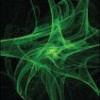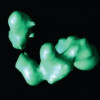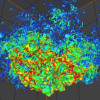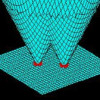News Archive
Scaling the Nanowire
The preeminent physicist-futurist Richard Feynman famously declared in a 1959 address to the American Physical Society that “there’s plenty of room at the bottom.” He then invited them to enter the strange new world of nanoscale materials, none of which had actually been invented, except in Feynman’s fantastical imagination. Read More »
DOE CSGF Practicum Profile: Julianne Chung
Julianne Chung has an appreciation for versatility, starting with her academic interests. She showed an aptitude for mathematics at an all-girls high school in her hometown of Chattanooga, Tenn., but Chung has a love for dancing that dates back even further. She followed both interests and graduated in 2004 from Atlanta’s Emory University with a major in mathematics and a minor in dance and movement studies. Read More »
FastBit: Digging through databases faster
Imagine trying to find someone in a New York City telephone book if the names were listed randomly. Read More »
Humanities and High Performance Computers Connect at NERSC
High performance computing and the humanities are finally connecting — with a little matchmaking help from the Department of Energy (DOE) and the National Endowment for the Humanities (NEH). Both organizations have teamed up to create the Humanities High Performance Computing Program, a one-of-a-kind initiative that gives humanities researchers access to some of the world’s most powerful supercomputers. Read More »
NERSC to Provide Resources to INCITE Projects Studying Combustion, Fusion Energy, Materials and Accelerator Design
BERKELEY, CA — Researchers tackling some of the most challenging scientific problems, from improving energy efficiency in combustion devices to developing new particle accelerators for scientific discovery to studying properties of new materials, have been awarded access to supercomputing resources at the U.S. Department of Energy’s (DOE) National Energy Research Scientific Computing Center (NERSC). The awards, announced Dec. 16 by DOE’s Office of Science, are made under the Innovative… Read More »
A Rising Tide of Cosmic Data
In 1998 the balloon-borne BOOMERANG and MAXIMA experiments made what were then the highest-resolution measurements of minute variations in the temperature of the cosmic microwave background radiation (CMB). Read More »
Advancing the science of advancing interfaces
Mathematician James Sethian works on the edge. He confronts one of the most challenging problems in physics: capturing the behavior of moving interfaces, the edges where one material pushes into or retreats from another – where a gas mixes and burns, where metals or coatings meet silicon chips, even where ink meets air. Read More »
Latest Integrated Microbial Genomes (IMG) Data Management System Update Release
WALNUT CREEK, CA--Version 2.4 of the Integrated Microbial Genomes (IMG) data management system, a resource provided to the scientific community for microbial genome data analysis, has now been released. Hosted by the U.S. Department of Energy Joint Genome Institute (DOE JGI), IMG has built a popular following as reflected in the overwhelming response to IMG workshops offered in Spring 2008, now full. DOE JGI has added a fall session, September 15-19, 2008. Registration is now open at http://www.jgi.doe.gov/meetings/mgm/. Read More »
Video: Intel, M'soft launch parallel lab
BERKELEY, Calif. — Researchers officially christened the Parallel Computing Lab here Monday (Dec. 1) in a newly renovated space at the University of California, Berkeley. The center has been conducting work for several months to define a new parallel programming model for tomorrow's many-core processors that could replace serial methods that have served mainstream computing since its inception. Read More »
Integrated Microbial Genomics Reaches Out to Include Human Microbial Communities
“We live in a microbial world,” says Nikos Kyrpides of Berkeley Lab’s Genomics Division. “There are millions of organisms in one drop of water and even more in soil. Life on our planet cannot be sustained without the microbes.” Read More »







 Instagram
Instagram YouTube
YouTube






